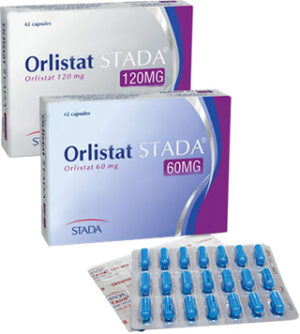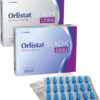Orlistat is a medication used to manage obesity by reducing the absorption of dietary fat in the body. It belongs to a class of drugs known as lipase inhibitors and is commonly marketed under the brand name Xenical. Orlistat works by inhibiting the action of the enzyme lipase, which is responsible for breaking down fat in the intestines. By blocking this enzyme, Orlistat prevents the absorption of fat, leading to weight loss.
There are certain contraindications to taking Orlistat. It should not be used by individuals who are allergic to the medication or any of its components. Orlistat is also contraindicated in individuals with chronic malabsorption syndrome or cholestasis. Pregnant and breastfeeding women should avoid the use of Orlistat, as its safety in these populations has not been established.
While Orlistat can effectively aid in weight loss, it may also cause some side effects. Common side effects include gastrointestinal issues such as oily spotting, flatulence, and fecal urgency. These side effects occur as a result of the medication’s mechanism of action, which prevents the absorption of dietary fat. It is important to note that these side effects are generally mild and transient.
When taking Orlistat, it is important to follow the recommended dosage and guidelines provided by your healthcare provider. The typical dose is 120 mg taken orally three times a day with each main meal. If a meal is missed or does not contain fat, the dose of Orlistat can be skipped. However, it is important to avoid doubling the dose to make up for a missed one. In case of overdose, observe for any signs of toxicity and seek medical attention if necessary.
Orlistat may interact with certain medications. It is important to inform your healthcare provider about all the medications you are currently taking, including prescription drugs, over-the-counter medications, and supplements. Orlistat can potentially reduce the absorption of fat-soluble vitamins, such as vitamin A, D, E, and K. Therefore, individuals taking multivitamins or supplements containing these vitamins may need to take them at least two hours before or after Orlistat ingestion.
- 1. Can Orlistat be used as a standalone weight loss method?
- 2. How long does it take to see results with Orlistat?
- 3. Can Orlistat be safely used in adolescents and children?
- 4. Are there any dietary restrictions while taking Orlistat?
- 5. Is Orlistat available over-the-counter?
No, Orlistat should be used in conjunction with a reduced-calorie diet and regular exercise for optimal weight loss results.
On average, individuals taking Orlistat may start to see weight loss results within the first two weeks of treatment. However, individual responses may vary.
Orlistat is generally not recommended for use in individuals under the age of 18. It is important to consult with a healthcare provider to determine the appropriateness of Orlistat use in younger populations.
While there are no specific dietary restrictions, it is recommended to follow a well-balanced, reduced-calorie diet to enhance the weight loss benefits of Orlistat.
Yes, a lower-dose version of Orlistat (60 mg) is available over-the-counter under the brand name Alli. However, the higher-dose version of Orlistat (120 mg) requires a prescription.


Reviews
There are no reviews yet.